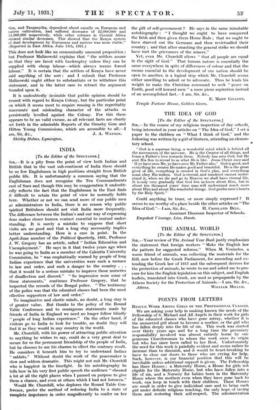INDIA [To the Editor of the SPECTATOR.] Sin, — It is a
pity from the point of view both Indian and British that in the vast sub-continent of India there should be so few Englishmen in high positions straight from British public life. It is unfortunately a common saying that the Englishman does not recognize the Ten Commandments east of Suez and though this may be exaggeration it undoubt- edly reflects the fact that the Englishman in the East finds it difficult to retain the point of view he normally holds here. Whether or not we can send more of our public men as administrators to India, there is no reason why public spirited Britishers should not• visit India more frequently. The difference between the Indian's and our way of expressing deas makes closer human contact essential to mutual under- standing. It is surely a mistake to suppose that short visits are no good and that a long stay necessarily implies better understanding. Here is a case in point. In the April-June number of the Political Quarterly, 1981, Professor J. W. Gregory has an article, called "Indian Education and Unemployment." He says in it that twelve years ago when he was going to India as a member of the Calcutta University Commission, he "was emphatically warned by people of long Indian experience that the universities were such a menace to law and order, and such a danger to the country . . . that it would be a serious mistake to improve those nurseries of disaffection and discord." "So impressive were some of these statements," continues Professor Gregory, that he inspected the records of the Bengal police. "The testimony of the police was that the educated classes had been the most effective supporters of law and order."
To imaginative and elastic minds, no doubt, a long stay is of greater value. But thanks to the policy of the Round Table Conference and to courageous statements made by friends of India in England we need no longer follow blindly "people of long Indian experience." On the other hand, if visitors go to India to look for trouble, no doubt they will find it as they would in any country in the world.
Mr. Churchill, with his power of attracting public attention to anything he wishes to say, could do a very great deal to secure for us the permanent friendship of the people of India, but he chooses to use his charms to effect the contrary result. He considers it beneath him to try to understand Indian "rabbits." Without doubt the work of the peacemaker is slow and seldom dramatic. This might not suit Mr. Churchill who is happiest in the limelight. In his autobiography he tells how in his very first public speech the audience " cheered a lot at all the right places when I paused on purpose to give them a chance, and even at others which I had not foreseen."
Would Mr. Churchill, who deplores the Round Table Con- ference, prefer the method of reducing India to a state of complete Impotence in order magnificently to confer on her
the gift of self-government ? He says in the same inimitable autobiography : "I thought we ought to have conquered the Irish and then given them Home Rule ; that we ought to have starved out the Germans and then revictualled their country ; and that after smashing the general strike we should have met the grievances of the miners."
Yet, even Mr. Churchill allows "that all people are equal in the sight of God." That human nature is essentially the same everywhere in spite of differences of colour and that the means essential to the development of one nation should 'be open to another, is a logical step which Mr. Churchill seems either unwilling to admit or to advocate. Thus he lends his weight to make the Christian command to' .seek "peace on Earth, good will toward men" a mere pious aspiration instead of an accomplished fact.—I am, Sir, &c.,


































 Previous page
Previous page